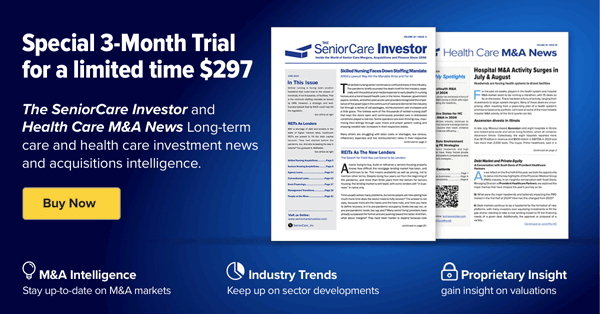In recent years, sale price announcements exceeding $1 billion have been a significant indicator of the strength of the healthcare industry’s revenue cycle management (RCM) subsector.
Industry experts highlight the factors driving interest in RCM companies.
“Historically, healthcare technology has been viewed as lagging behind other industries, but we’re seeing today’s technology evolve at a much faster pace,” said Brian Greenberg, CEO of Rockville, Maryland-based Greenberg Advisors, LLC, which provides M&A and strategic advisory solutions to business services and technology companies in the RCM, healthcare information technology and related markets. “The computer-assisted coding platforms that long dominated the coding software market have given way to autonomous coding solutions. Denials management software, which often used to be classified as a ‘workflow driver,’ is now commonly introduced as a platform that offers [artificial intelligence]-enabled models to predict and prevent denials.
“Administrative activities represent up to 30% of the total health care costs in the United States, and at least half of that spending has been determined to be wasteful. Administrative activities are a prime opportunity to reduce expenses. One administrative area ripe for AI is the process of importing, standardizing and analyzing data. This data creates incredible opportunities, but also creates many difficulties, when it comes to synthesizing information from disparate systems. Investors are anxious to fund companies that have the potential to resolve this issue.”
The most recent example of the big-dollar sale trend took place in April 2024 when Austin, Texas-based Vista Equity Partners, a private equity firm with more than $101 billion in cumulative capital commitments as of September 2023, purchased San Mateo, California-based Model N.
Model N provides revenue optimization and compliance for pharmaceutical, medtech and high-tech firms. It has additional locations in Tennessee, Colorado and Delaware as well as India and Switzerland.
The deal was announced on April 8. The price was $1.25 billion.
An RCM transaction with an identical price was reported last year, according to the LevinPro HC database.
Sarasota, Florida-based Roper Technologies, which designs and develops software and solutions for healthcare, transportation, food, energy and other industries with FY 2022 revenue of approximately $5.37 billion, acquired Syntellis Performance Solutions of Chicago. Syntellis provides enterprise performance management software, data and intelligence solutions for healthcare, higher education and financial institutions. Syntellis is expected to contribute approximately $185 million in revenue and $85 million in EBITDA in 2024, including planned cost synergies. The deal was announced on Aug. 8, 2023.
The second-largest deal in the market in 2023 occurred when Chicago-based R1 RCM Inc. — which is an RCM company servicing hospitals, health systems and physician groups — acquired Acclara of Houston for $675 million on Dec. 6, 2023.
Two deals in 2022 exceeded the billion-dollar level.
The year began with an announcement on Jan. 10, 2022, in which R1 RCM purchased Cloudmed of Atlanta for $4.1 billion. Cloudmed is a healthcare technology company focused on revenue intelligence and data-driven insights that partners with more than 3,100 healthcare providers in the U.S. and recovers over $1.5 billion of underpaid or unidentified revenue for its clients annually.
“More M&A activity is likely ahead, especially driven by strategic acquirers, as those market leaders with strong AI and technology resources seek acquisitions to add new clients or expand their solutions,” Greenberg said. “Cloudmed, which was acquired … from private equity firm New Mountain Capital … is an excellent example of this. Cloudmed grew through at least 14 add-on acquisitions of highly specialized services firms, each of which had a unique reimbursement-related focus. At the same time, the company acquired and developed an advanced AI platform that could be integrated into its acquisitions to improve efficiency and outcomes.”
TPG Capital, a global alternative asset management firm founded in San Francisco in 1992 with $127 billion of assets under management and investment and operational teams in 12 offices across eight countries, acquired ClaimsXten of Saint Paul, Minnesota, for $2.2 billion on April 4, 2022, from Change Healthcare.
No billion-dollar deals were posted in 2021.
The top transaction in 2021 was the $400 million acquisition of Sentry Data Systems, Inc. on June 8, 2021, by Craneware plc of Atlanta, which provides RCM services for hospitals using its Trisus platform. Sentry provides technology solutions that help healthcare providers reduce the total cost of care, manage compliance, and produce better quality.
Global Growth
The global RCM market size was estimated at $306.8 billion in 2023 and is projected to grow at a compound annual growth rate of 11.39% from 2024 to 2030, according to Grand View Research.
Greenberg added that patient scheduling and communication are areas that are undergoing rapid expansion.
“It’s well-documented that early and frequent patient communication generates substantial benefits to care outcomes and revenue cycle performance,” Greenberg said. “The adoption of scheduling and patient communication solutions has helped bridge the gap between patients’ desired level of communication and providers’ ability to meet those demands.
“New opportunities are emerging as technology improves efficiencies and effectiveness, and artificial intelligence could be the next game-changer. Even beyond these mega-deals, it’s clear that there is increased interest in this part of the market.”
Greenberg identified four reasons that have boosted the appeal of RCM firms. They include:
- Cost pressures: “Providers face increased cost pressures due to rising operational expenses, declining reimbursements from payors and the need to invest in an expensive technology infrastructure,” he said. “Outsourcing RCM can help mitigate these cost pressures by reducing the need for significant investments in technology and staffing.”
- Regulatory changes: “The regulatory landscape in healthcare, including continually evolving CPT codes, compliance requirements and ever-changing reimbursement models, has made RCM increasingly complex,” he said. “Outsourcing RCM to specialized firms ensures compliance with regulations, reducing the risk of costly penalties for non-compliance.”
- Headaches: “Outsourcing RCM functions can help avoid headaches,” he said. “Staffing challenges, payors finding new ways to deny claims, a web of technology systems that require integration and many other factors contribute to the issues that come with providers performing RCM functions in-house. There are upsides to that approach, but for many hospitals it comes down to where they want to dedicate their time and resources. Most would agree that those resources are best spent on patient care and satisfaction, while leaving [at least some] revenue cycle functions to the experts.”
- Technological advancements: “The growth of technology in healthcare, including analytics and automation tools, has transformed the RCM process,” he said. “RCM firms leverage technology from the front end [automated insurance verification] to the back end [denials management workflow tools] of the revenue cycle to remain competitive. Outsourcing RCM services allows providers to leverage advanced technologies and expertise that they may not have in-house, and, in theory, leads to increased efficiency, accuracy and productivity.”
While sale prices have remained strong at the highest levels, deal volume has moderated recently.
Transaction Totals
Deal totals more than doubled from 2020 to 2021, accelerating from 28 to 61. Transactions reached 68 in 2022 but then fell off to 55 in 2023. Only nine deals were posted during the first three months of 2024.
“Given the size of transactions that financial investors do, they are generally more dependent on today’s more expensive debt capital to help finance deals, whereas strategics have more flexibility by using cash from their balance sheet, which is utilized to a greater degree in smaller deals,” he said.
Greenberg added that with the increased cost of capital in 2023, financial investors had to be more selective in the deals they pursued, and many adjusted their valuations downward to account for the increased financing expenses. He said this resulted in two main situations that led to fewer acquisitions:
- There were fewer targets to pursue. Many private equity-backed companies decided to delay a sale to wait for a more favorable financing environment and better valuations. “We expect this to change in the second half of 2024 and even more so in 2025,” he said. “In the meantime, some private equity owners are utilizing continuation funds to extend their hold period while satisfying their limited partners’ liquidity needs.”
- Financial investors could not match the valuation expectations that owners held onto from prior years when deal financing was cheaper. “In the current environment, it can be difficult for financial buyers to compete with strategics, who can find post-transaction cost savings or synergies to effectively lower the multiple that they pay for a business,” he said.
Despite the challenges, Greenberg is bullish regarding future M&A activity in the RCM subsector.
“Several factors look promising for M&A activity over the next 12 months,” he said. “Many M&A advisory firms are reporting record pitch activity, which aligns with the large backlog of deals waiting to come to market. Fewer exits by private equity firms over the past 18 months have resulted in a tremendous amount of unrealized value in private equity portfolios, with some estimating median hold periods of more than 5.5 years.
“At some point soon, those investors will just have to exit, to appease their limited partners and other constituents. And while election years usually add some unknowns to the M&A market, the expected interest-rate reductions from the Federal Reserve in the second half of 2024 should bring further stability to the M&A market, providing greater confidence for buyers and sellers to transact.”
Glenn Kalinoski is a healthcare analyst at Levin Associates.


